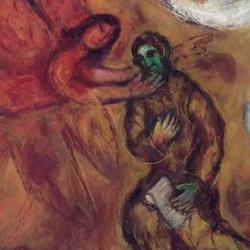The story of Sennacherib’s siege of Jerusalem turns on hearing – who hears what and what do they do in response.
The issue gets raised initially by the delegation from Hezekiah that meets with the Rabshakeh at the conduit of the upper pool. When the Rabshakeh speaks to them in street Hebrew, they ask him to speak instead to speak in the lingua franca of the day, Aramean (Isaiah 36:11). The literate officials can “hear” Aramean, but the mean on the wall cannot. They want to be able to spin the message from Sennacherib, not let it get unedited to the people, who might be unsettled by it.
The Rabshakeh refuses to comply, and instead continues to speak in “Judaean.” His first word to the men on the wall is the plural of shema : “Hear (O Israel), the words of the great king” (v. 13). He warns them not to “hear” Hezekiah (v. 16). The Judean delegation says nothing, but they report back so that King Hezekiah “hears” (37:1). He tears his clothes, and enters the temple, but he goes in the hope that Yahweh has “heard” the words of the Rabshakeh (37:4). Isaiah assures Hezekiah that Yahweh has heard (37:22-23).
Yahweh’s response is to put something in the ear of Sennacherib: He will “hear” a rumor that will make him scramble back to his own land (37:7). Yahweh is an eavesdropper on the original diplomatic gathering. He hears, marks, and acts. The God who calls Israel to hear Himself hears, and saves.










